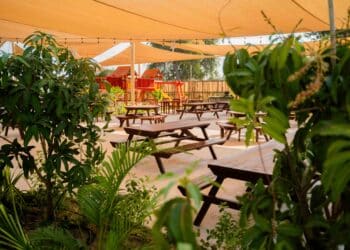Over the past few years, AccorHotels has moved in new strategic directions through high-profile deals and acquisitions, however this hasn’t been limited to rooms. Amir Nahai, chief executive officer food & beverage, tells Crystal Chesters how he has overhauled the company’s strategy to create excellence, authenticity and simplicity across its 9,000-strong F&B portfolio.

Amir Nahai joined AccorHotels as chief executive officer F&B in 2015 when the company was undergoing a number of strategic changes. Over the past few years, the French hotel operator has ramped up its growth in the luxury hotel segment through the acquisition of FRHI Hotels & Resorts, entered the resort segment through strategic partnerships with Banyan Tree and Rixos Hotels, moved into the lifestyle arena with Mama Shelter, Jo&Joe and 25hours brands, and has also accelerated its position in the luxury homes rental market by acquiring onefinestay, Squarebreak and Travel Keys. And while the focus of these deals appears to be rooms, Nahai says F&B has been a core part of the company’s overall reinvention. In fact, he calls it “the biggest differentiator” for AccorHotels.
“It’s easy to have a pretty good picture of what room occupancy is going to be. The biggest differentiator is how cool is the F&B? How good is the bar and restaurant? This is a huge chunk of our revenue,” say Nahai.
Prior to joining AccorHotels, Nahai worked for management and consulting firm Bain & Company and spent the last eight years of his tenure focusing on tech media, hospitality and entertainment. AccorHotels – a client of Nahai’s at Bain – brought him on board to architect a new plan for the group’s F&B portfolio, which encompasses more than 9,000 venues worldwide.
Nahai is clear that the strategy wasn’t about choosing any particular management model; he believes there is no one-size-fits-all when it comes to this. “Whether you lease or don’t lease, it’s all appropriate but not all of the time.
“It depends on the location and venue. We have some great examples of successful partners but I don’t think it’s right to have a blunt strategy and say, ‘we will outsource everywhere’. We look at it on a case by case basis.”
“Food and beverage is complicated; it’s a really hard business and if you haven’t done everything you can to simplify it and remove unnecessary complexity, then honestly, you’re dead on arrival. Everything must contribute to the guest experience and enhance what they’re doing, what they’re eating and drinking, and the ambience”
Instead, Nahai’s first objectives were to educate his teams on the importance of F&B to AccorHotels, and to achieve a shared view at a global level and utilise this to devise a clear roadmap for the future.
“The first and simplest point is making F&B a priority,” Nahai comments. “It’s telling our teams that we’re not just a hotel company; we’re one of the biggest food and beverage companies in the world.”
AccorHotels identified eight trends that define its view on F&B today. These weren’t cyclical trends that change from month to month, but rather long-term patterns that can be seen on a global scale. People being interested in and informed about F&B, the desire for health, the prevalence of social activity, and a lack of time are some of the ‘trends’ that were defined.
“There’s a lot you can say about trends and how everything is changing every day and how the world is impossible. What we’ve done instead is say ‘hey, here are eight things that matter today’. The world isn’t changing every day; the things impacting us today have been around for a while and will continue for a while,” says Nahai.
The next step was to create a set of actions – or pillars – that underpin Accor’s response to its view on F&B. The first, is that everything must be simple, excellent and authentic.

Nahai comments: “Hotels forget to ask themselves: ‘is the food and beverage I’m serving excellent? Is the product really good in terms of the music, the lighting, the ambience? Are the basics done in an incredibly solid way?’ People’s view on what is excellent has to do with simplicity. They want short menus, an uncomplicated experience and dishes that put the ingredients forward without too many frills.
“Food and beverage is complicated; it’s a really hard business and if you haven’t done everything you can to simplify it and remove unnecessary complexity, then honestly, you’re dead on arrival. Everything must contribute to the guest experience and enhance what they’re doing, what they’re eating and drinking, and the ambience.”
Other pillars are listening to guests, reading and responding to their feedback quickly and incorporating this into the development of the outlet; creating an excellent company culture and ensuring Accor is the best place for F&B talent to work; and encouraging and supporting local innovation.
“It’s no longer about Paris and outward,” says Nahai explaining this last point. “I want our hotels to take charge of their own innovation and collaborate with each other – it shouldn’t be about what comes from the Accor headquarters.
“Are we 100% of the way there? No. But I’d say 18 months in, most of our teams have internalised this and are starting to head in this direction,” he says.
Examples of excellent, local F&B innovation are key to inspiring and educating Accor team members on what can be done, says Nahai. He cites the examples of Cubanolito at Ibis World Trade Centre in Dubai and Bokan at Canary Wharf, London, as some of the Accor venues he is most proud of. Explaining what sets Bokan apart, he says: “It screams I’m very local, I’m authentic – it’s not what you’d expect from a Novotel”.

Fairmont Dubai – home to Bistrot Bagatelle, Catch and Cirque Le Soir among others – is another example that springs to Nahai’s mind. “Fairmont Dubai has a selection of the top restaurants in the world under its roof,” he says. With FRHI having long been a strong player in F&B in the region, Nahai admits the company – which specialises in the luxury segment – has taught Accor some lessons since the acquisition in July last year.
“A lot of new places have opened since the acquisition and what we’ve been trying to do is enhance and accelerate where possible. It isn’t about changing FRHI for the sake of it; in that segment, a lot of it has been learning from FRHI and ensuring we can help accelerate what they’re doing and apply it to AccorHotels where possible.”
Nahai expects that AccorHotels’ view of F&B today will continue for the foreseeable future and his ultimate goal is to achieve tangible results, with F&B venues that meet the criteria of the four pillars. “You’re already starting to see the impact as we open up a new generation of venues that are really cool and really relevant to local areas,” he says.
“Our view is not something we intend to change in 12 months. It’s solid and we will continue the work with our teams and encourage and support them in developing concepts, experiences and venues that are relevant to their local communities and to our guests.”



































































